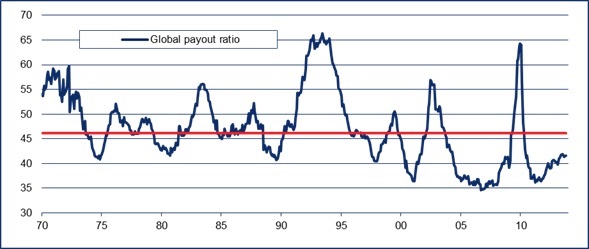Re-connecting with earnings
Will next year remain positive?
Alex Crooke, Manager, Bankers
 View the Bankers company profile page
View the Bankers company profile page
Equity markets are in a transition. In recent years we have been witness to global markets propelled by sentiment; 2014 should usher in change as they switch to become driven by fundamentals anchored in the business cycle revival.
Next year should remain positive for equities as the global economy picks-up. Companies should start to invest more and unemployment more markedly fall. Indeed fund flows suggest that confidence is returning and rising exports and new orders indicate a recovery in global trade. Following a largely muted 2013 company reporting season, with global earnings-per-share (EPS) estimates at around 5-7%, 2014 should see a re-acceleration in EPS growth with improvements to around 12%1. We’ve had a long stint of fiscal conservatism by companies and a reticence to hand out too much cash, and with global payout ratios still well below the long-term average [Chart 1], next year should also see an improvement in dividends.

Chart 1: Global payout ratio – percentage of net income paid out as dividends. Citigroup, Global Equity Strategist Report, 21 November 2013
Another broad expectation of 2014 is ‘tapering’ - the process of gradually withdrawing stimulus from central bank liquidity schemes. Whenever this may occur one thing is clear, the rising tide of cash will no longer be available as a prop. As markets re-connect with earnings only the good companies will progress, grow their bottom-line, and see dividends follow suit. Picking these winners is particularly important because valuations also tell us something else – equities no longer appear very cheap.
More specifically we are bullish on developed markets (DM) over emerging markets (EM). The UK is experiencing growth again, Europe’s austerity is relaxing and domestic consumption rising, and Japan looks promising amid supply-side reforms driven by a weakened yen; potentially turning a net exporter of deflation into one of reflation. Although we are bearish on EM, China is demonstrating more value. There, wage growth and improving working conditions are taking hold and a burgeoning middle class with increasing amounts of disposable income are driving discretionary spend; presenting us with some interesting thematic drivers. Certain areas the Bankers Investment Trust have invested include duty free, electric appliances, and transport.
Another area where we see value is in banks; particularly in the UK, US and Asia. In an effort to increase lending Central Banks have been attempting to steepen yield curves by keeping short-term rates low and pushing up long-term rates. This is having the desired positive effect of increasing loan growth and leading to a better return on their deposits. Retail banks are attractive because the overall effect is improved profitability, at the same point when loan losses are diminishing.
We think the Bankers Investment Trust is well positioned with quality companies that are capable of growing their earnings because over the coming year, we think it will be a stock picker’s market.

